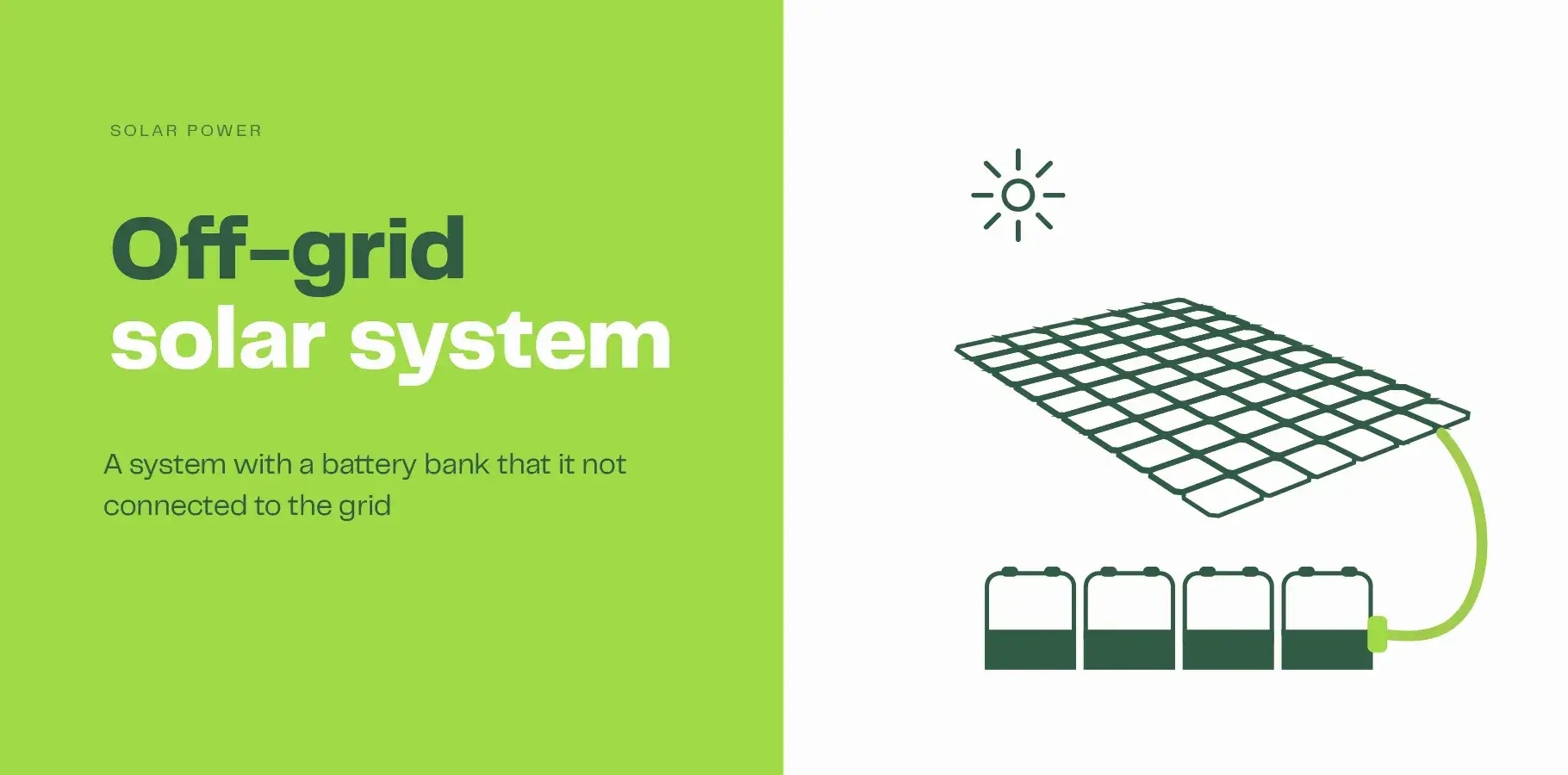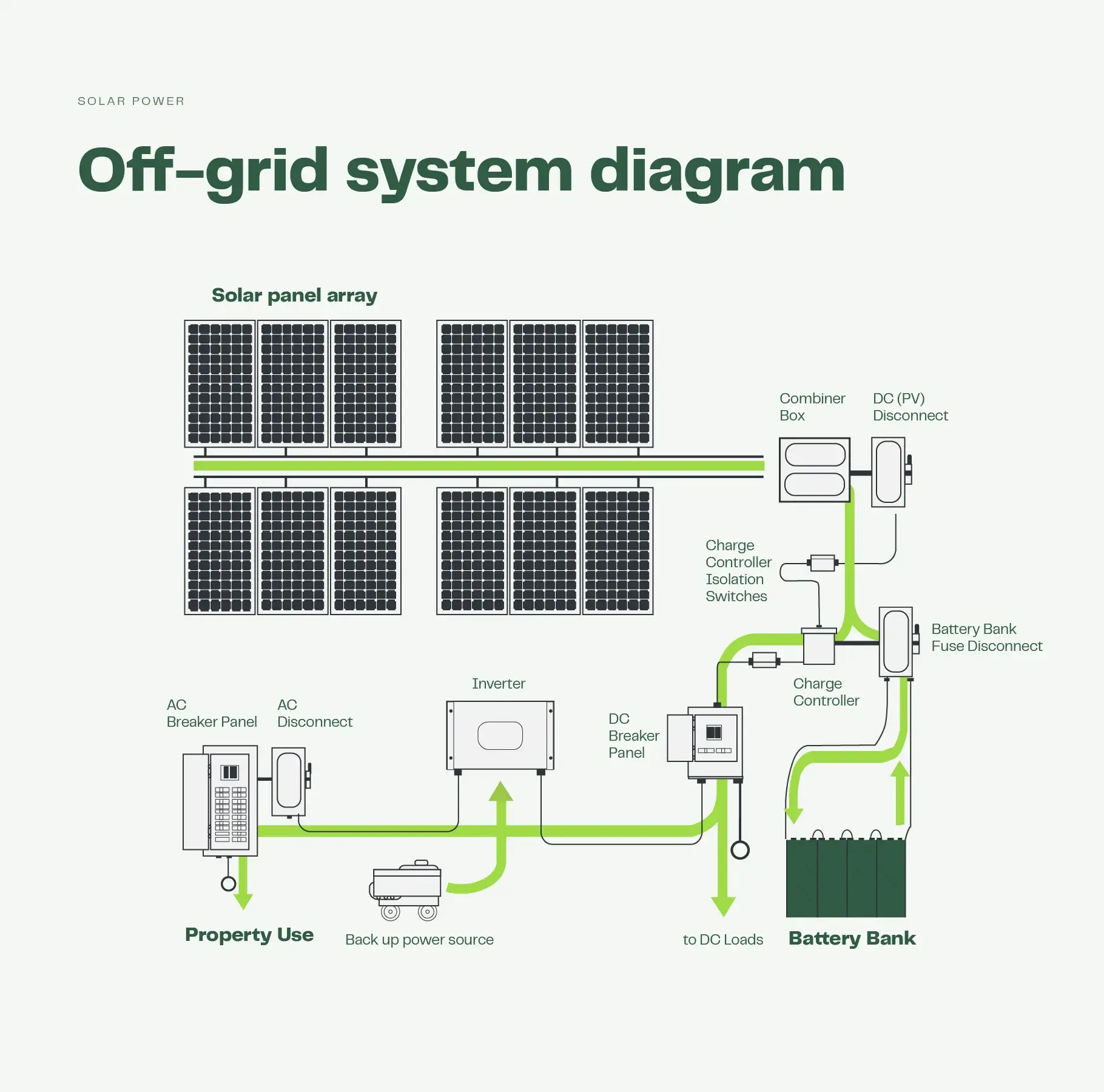A guide to off-grid solar
Stand-alone solar systems.
An off-grid solar system is a stand-alone unit that is not connected to the electricity grid.

Off-grid solar systems are expensive and are typically only a viable option when the cost to connect a property to the electricity network is exorbitant. If you have a grid connection, you are far better buying a solar panel system. This guide covers:
- Off-grid system prices
- Off-grid system size
- How does off-grid work?
- Considerations before you buy
- Finding an off-grid installer
Stand-alone solar system prices
Off-grid solar system prices vary depending on how much power you use, your location and the amount of backup power that you have.
Average off-grid system prices:
| Dwelling size | Average price |
|---|---|
| Small 2Br home | $15,000 – $25,000 |
| Average 3Br home | $15,000 – $25,000 |
| Average 4Br home | $25,000 – $45,000 |
| Heavy power user | $45,000 – $70,000+ |
Battery storage makes off-grid expensive
The cost of an off-grid system for a typical Australian home (18kWh / day) ranges between $25,000 – $45,000. The price is much higher due to the amount of battery storage necessary to power your home during winter months and days of minimal solar production. By comparison, a 6.6kW solar system would provide ample solar power for the same electricity usage, but the cost is dramatically lower at between $6,000 – $8,500.
Battery life
Solar batteries are the most expensive component of an off-grid system, and the cost of replacing them is high. You will likely need to replace the batteries every ten years. The cost to replace the batteries may be up to half the cost of your total stand-alone system.
System size for off-grid solar
The key to a successful off-grid system is installing enough panels and batteries to power your daily electricity usage and not leave you in the dark, literally! The best way to start is to calculate your daily electricity needs; our off-grid solar calculator does this for you by going through each appliance in your house.
Days of autonomy
If you do not have any backup power in the form of a generator, you want enough solar storage to get you through three days. If your panels do not generate any solar energy in three days, you will still have power. The amount of storage and days of autonomy depends on your location; far more storage is necessary in Tasmania and Victoria as opposed to Queensland. Some off-grid installers recommend more panels and less storage, and it is best to lean on them for advice as they will understand your local conditions.
Backup power source
It is common for stand-alone solar systems to have a back-up power source in the form of a diesel generator or wind turbine. Backup power is beneficial and can alleviate the 100% reliance on battery storage.
How does off-grid solar work?
Off-grid Solar Systems work by generating electricity from solar panels and using it to charge a solar battery via a charge controller. An inverter converts the direct current(DC) to alternate current(AC) so that it can power your home or business appliances. Excess solar power charges your solar battery so that you can use the electricity at night or during times when your system is not generating power.

Components of an off-grid solar system
For an off-grid solar power system to work effectively in the average home, you will require the following components:
- Solar panels
- Solar battery bank
- An inverter
- Solar charge controller
- Alternative energy source (optional)
Solar panels
Solar panels are a must for a stand-alone system. The number of panels you need will depend on your daily electricity usage and location.
Solar batteries
A solar battery is also necessary to allow your home to continue to run after the sun goes down. Throughout the day, your solar battery will charge as your panels generate excess electricity. Rather than simply losing out on all of that available solar power, a battery enables you to keep it for use at a later time. A stand-alone solar system typically needs a battery bank rather than a single unit.
Solar inverter
The solar inverter converts the direct current collected by your solar panel array into the alternating current required to run your household appliances and electronics. For an off-grid system, you will likely use a stand-alone inverter, though there are a few options when it comes to set-up.
Solar charge controller
The solar charge controller or battery charger is vital to the health of your battery. The controller regulates the voltage and current that your solar battery receives, to prevent overcharging and damage.
Alternative energy sources
It may be worth considering an alternative source of energy as a back-up for your system. Backup power sources are especially handy during the depths of winter when solar production is at its lowest. Many owners who use off-grid systems combine them with a generator that can power some of their homes’ electricity needs.
Is going off-grid right for you?
Unless the cost to connect to the electricity grid is exorbitant, we recommend buying a grid-connect system. Typically, if the grid-connection cost is below $25,000, you are better off connecting and then buying solar panels or a hybrid system. It is possible to derive the benefits of solar panels without forking out so much on an off-grid system.
Environmental impact
Sustainable living is one of the motivating factors for many off-grid system owners, and using a renewable resource like solar power seems like the perfect way to lower your carbon footprint. However, your excess, clean energy goes to waste with an off-grid system. If you have a grid connection, your solar energy can be exported back into the grid and then used by someone else.
Energy independence
If you have a grid connection and you want total energy independence, then you are better to go for a hybrid solar system with back-up power functionality. A hybrid system will be much cheaper than a stand-alone unit and, you can use power from the grid when you need it.
You are on your own
If your power system is knocked offline by equipment failure or inclement weather, your energy company isn’t coming to your aid. You must have total confidence in your system components and the person installing your unit.
Find the right installer for your off-grid system
Off-grid system installation is a specialty craft and not a service that most solar companies provide. The quality of the installation is paramount to the ongoing operation of the system. We can put you in touch with specialist off-grid installers. All you need to do is complete our off-grid quote request.

Are you ready for the benefits of solar?
Get 3 free quotes and start your journey towards making the switch.
Get free quotes